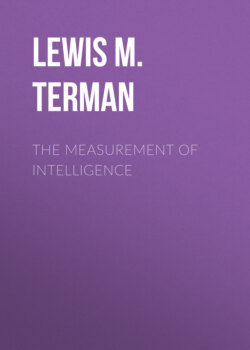Читать книгу The Measurement of Intelligence - Lewis M. Terman - Страница 8
На сайте Литреса книга снята с продажи.
Intelligence tests of the feeble-minded.
ОглавлениеTable of Contents
Thus far intelligence tests have found their chief application in the identification and grading of the feeble-minded. Their value for this purpose is twofold. In the first place, it is necessary to ascertain the degree of defect before it is possible to decide intelligently upon either the content or the method of instruction suited to the training of the backward child. In the second place, intelligence tests are rapidly extending our conception of “feeble-mindedness” to include milder degrees of defect than have generally been associated with this term. The earlier methods of diagnosis caused a majority of the higher grade defectives to be overlooked. Previous to the development of psychological methods the low-grade moron was about as high a type of defective as most physicians or even psychologists were able to identify as feeble-minded.
Wherever intelligence tests have been made in any considerable number in the schools, they have shown that not far from 2 per cent of the children enrolled have a grade of intelligence which, however long they live, will never develop beyond the level which is normal to the average child of 11 or 12 years. The large majority of these belong to the moron grade; that is, their mental development will stop somewhere between the 7-year and 12-year level of intelligence, more often between 9 and 12.
The more we learn about such children, the clearer it becomes that they must be looked upon as real defectives. They may be able to drag along to the fourth, fifth, or sixth grades, but even by the age of 16 or 18 years they are never able to cope successfully with the more abstract and difficult parts of the common-school course of study. They may master a certain amount of rote learning, such as that involved in reading and in the manipulation of number combinations but they cannot be taught to meet new conditions effectively or to think, reason, and judge as normal persons do.
It is safe to predict that in the near future intelligence tests will bring tens of thousands of these high-grade defectives under the surveillance and protection of society. This will ultimately result in curtailing the reproduction of feeble-mindedness and in the elimination of an enormous amount of crime, pauperism, and industrial inefficiency. It is hardly necessary to emphasize that the high-grade cases, of the type now so frequently overlooked, are precisely the ones whose guardianship it is most important for the State to assume.
